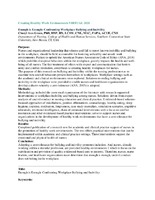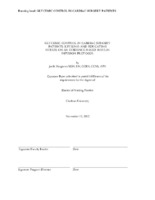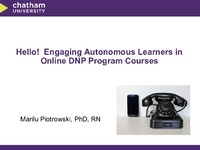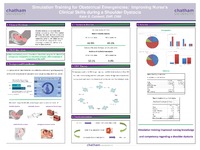Browsing by Sigma Chapters "Chi Zeta"
Now showing items 1-14 of 14
-
Aligning Outcomes, Assignments, and Assessment in Designing an Effective Online Program
(2016-03-21)Session presented on Sunday, November 8, 2015: Higher education institutions are increasingly expected to link the academic pedagogies in a manner that facilitates the application of practice-level skills. In an effort to ... -
Decreasing tracheostomy associated hospital acquired pressure injuries in critical care and step-down units
(2018-07-03)The purpose of this evidence-based practice initiative was to reduce the incidence of hospital-acquired pressure injuries related to a tracheostomy in critical care and step-down units. Pre-EBP initiative, there were 8 ... -
Doctoral nursing students' use of evidence-based knowledge, skills, and attitudes of scholarly writing
(2017-06-19)Purpose: Scholarly writing is required for doctoral program graduates who plan to disseminate their work and advance the discipline of nursing. However, nurses enter doctoral programs with varying ability and experience ... -
Enhancing the faculty onboarding experience
Providing faculty with supportive environments can lead to the integration of best pedagogical and assessment practices in the classroom, lab and practicum setting. The purpose of this presentation will focus on how one ... -
Enough is enough: Confronting workplace bullying and incivility
Failure to uphold the American Nurses Association Code of Ethics (ANA, 2018) which prohibits disruptive behaviors within the workplace, gravely impacts the health and well-being of all nurses. The fair treatment of others ... -
Glycemic control in cardiac surgery patients: Revising and educating nurses on an evidence-based insulin infusion protocol
Glycemic control following cardiac surgery is challenging. Inadequate glycemic control, whether it is hypoglycemia or hyperglycemia, is associated with poor patient outcomes. Recently published studies examining glycemic ... -
Hello! Engaging autonomous learners in online DNP program courses through telecommunication
Learners appreciate online programs to afford flexibility in their time management. This presentation focuses on the use of periodic, structured faculty-student telecommunications during capstone-related DNP courses. ... -
King's Theory of Goal Attainment improves students' performance with academic difficulties in a nursing program
The purpose of this EBP quality improvement project was to emphasize King's Theory of Goal Attainment focusing on the instrumental value of King's Interpersonal System in an Associate Degree Nursing program. Promoting ... -
Mindfulness-based educational strategy to increase data analysis self-efficacy of DNP students
This session describes a mindfulness based educational strategy that was used in an online program to increase DNP students' data analysis self-efficacy. Implementation steps and students' responses will be discussed. ... -
Perceptions of Leadership Self and Means Efficacy Among Nursing Faculty: An Exploratory Study
The call for nursing faculty leadership development has been reignited by the National Academy of Medicine and the National League for Nursing. Faculty must take the first step to meet this call by self-reflecting on their ... -
Psychological capital: An introduction to the what, why, and now what?
(Sigma Theta Tau International, 2021-10-26)Psychological Capital (PsyCap) is a set of internal resources consisting of hope, efficacy, resiliency, and optimism-or HERO—that help navigate personal and professional obstacles to achieve success and foster ... -
Re-Shaping Communication Skills in Order to Enhance the Patient Experience
Communication is an integral part of the nursing profession, regardless of venue or specialty area. Communication is the basis upon which relationships are initiated and established. Despite ongoing professional efforts ... -
Simulation training for obstetrical emergencies: Improving nurse's clinical skills during a shoulder dystocia
(2017-07-03)Perinatal mortality and morbidity are a significant problem with the mortality rates attributed to antenatal and intrapartum complications. After reducing perinatal mortality and morbidity by way of good maternal health, ... -
Transformational Leadership: No Longer Novel, but Critical for Future Success
This session focuses on the hallmark characteristics of transformational leadership, organizational impact, employee satisfaction, the connection to academic and practice partnerships, and implications for future practice.













